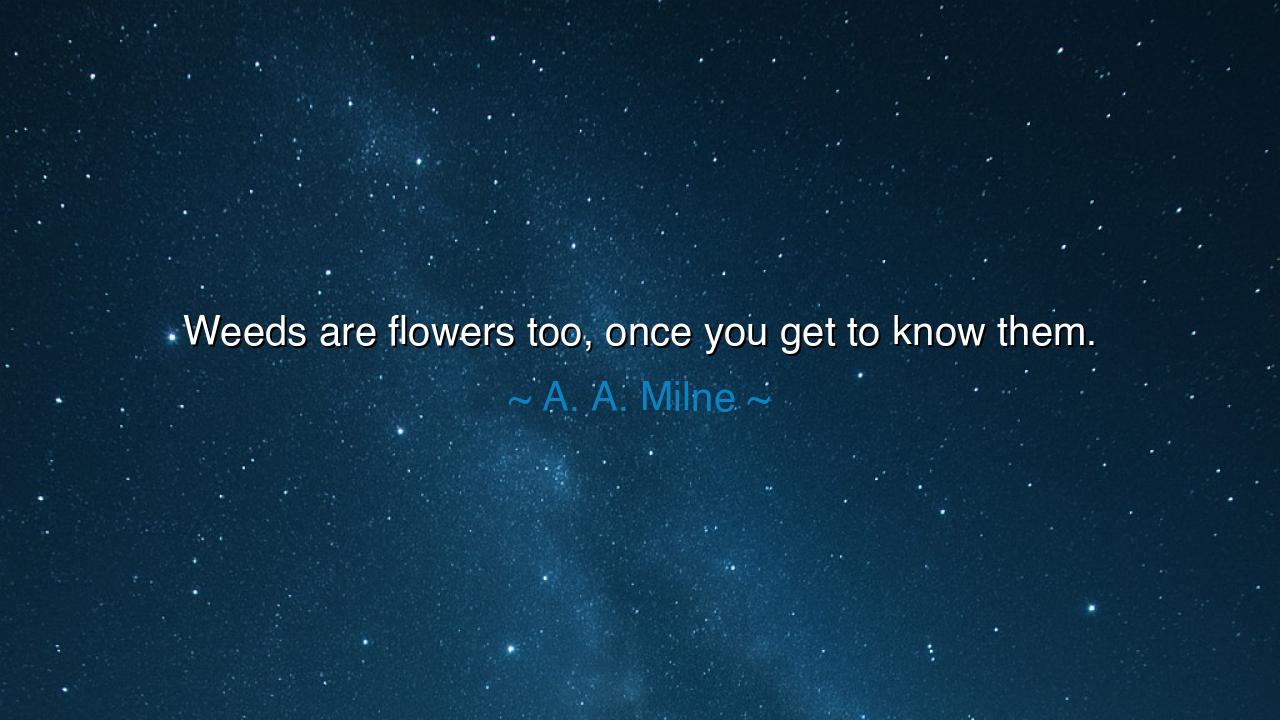
Weeds are flowers too, once you get to know them.






The English author A. A. Milne, known for creating Winnie the Pooh, once wrote the gentle and profound words: “Weeds are flowers too, once you get to know them.” At first, the line seems innocent, a passing observation about nature. Yet beneath its simplicity lies a wisdom that pierces to the core of human perception. Milne reminds us that the boundary between beauty and ugliness, between value and worthlessness, is often drawn by ignorance, not truth. The weed and the flower both rise from the same soil, both drink the same sunlight, and both yearn for the sky. It is we who decide which to cherish and which to cast away.
This quote speaks to the deeper law of understanding that governs both gardens and hearts. Every being, every soul, every life holds a secret beauty—hidden perhaps, unpolished, misunderstood. The weed, in Milne’s eyes, is not an enemy of the flower but a misunderstood companion. The difference between the two lies not in essence, but in perception. When one takes the time to look closely, to know the weed’s shape, fragrance, and place in the order of nature, one begins to see the divine equality of creation. Thus, Milne teaches that to know something—or someone—truly is to find its worth.
The origin of this thought arises from the same humility that poets, monks, and gardeners have shared across ages. In the ancient East, sages would sit among wild plants and find enlightenment in the smallest leaf. They saw that every living thing, even what men scorned, carried a spark of the eternal. What we call “weed” today may once have been a medicine, a healer, or a sacrifice offered to the gods. The lesson is timeless: prejudice blinds the eye, but understanding opens the heart.
Consider the story of George Washington Carver, the humble botanist who transformed the fields of the American South. When others saw worthless weeds in the barren soil, Carver saw life waiting to be known. Through study and patience, he discovered hundreds of uses for the peanut, the sweet potato, and other humble plants dismissed by the world. His greatness lay not in conquering nature, but in seeing beauty where others saw waste. Like Milne’s gardener of the soul, Carver looked at the weeds and saw flowers. His vision turned poverty into plenty, and despair into renewal.
On a human level, Milne’s words are a call to compassion. There are “weeds” among people too—those whom society rejects, misunderstands, or fears. Yet when we take the time to “get to know them,” to see their struggles, stories, and dreams, we often find that they bloom with quiet strength and hidden grace. Many of history’s greatest souls were once dismissed as weeds: Vincent van Gogh, scorned in life and celebrated only in death; Rosa Parks, a simple seamstress who changed the world through her quiet defiance; Nelson Mandela, imprisoned as a rebel but remembered as a redeemer. Each of them was a flower misunderstood by their age.
There is a sacred humility in recognizing this truth. When we cease to divide the world into what is “worthy” and “unworthy,” we begin to see with the eyes of creation. The garden, once filled with enemies and intruders, becomes a place of unity and wonder. The weeds, left to grow in their place, reveal new patterns of color and resilience. So too in life: when we learn to accept imperfection, to embrace difference, we find beauty blooming in unexpected corners of our hearts.
The lesson, then, is this: look again before you judge. Do not pull from your life what you do not yet understand. The weeds that trouble you today may be the medicine you need tomorrow. Take time to know people, to listen, to see beyond the surface. Let empathy be your sunlight and patience your soil. In doing so, you will discover what Milne knew—that the garden of the world is vast, and every root within it has a purpose.
For in truth, weeds are flowers too, and every soul, no matter how small or strange, holds a fragment of the divine. The wise do not destroy what they do not know—they seek to understand it. When you begin to see as the gardener of the spirit sees, you will find beauty in the wild, meaning in the unwanted, and love even in the overlooked. Then, and only then, will your garden—within and without—truly bloom.






AAdministratorAdministrator
Welcome, honored guests. Please leave a comment, we will respond soon